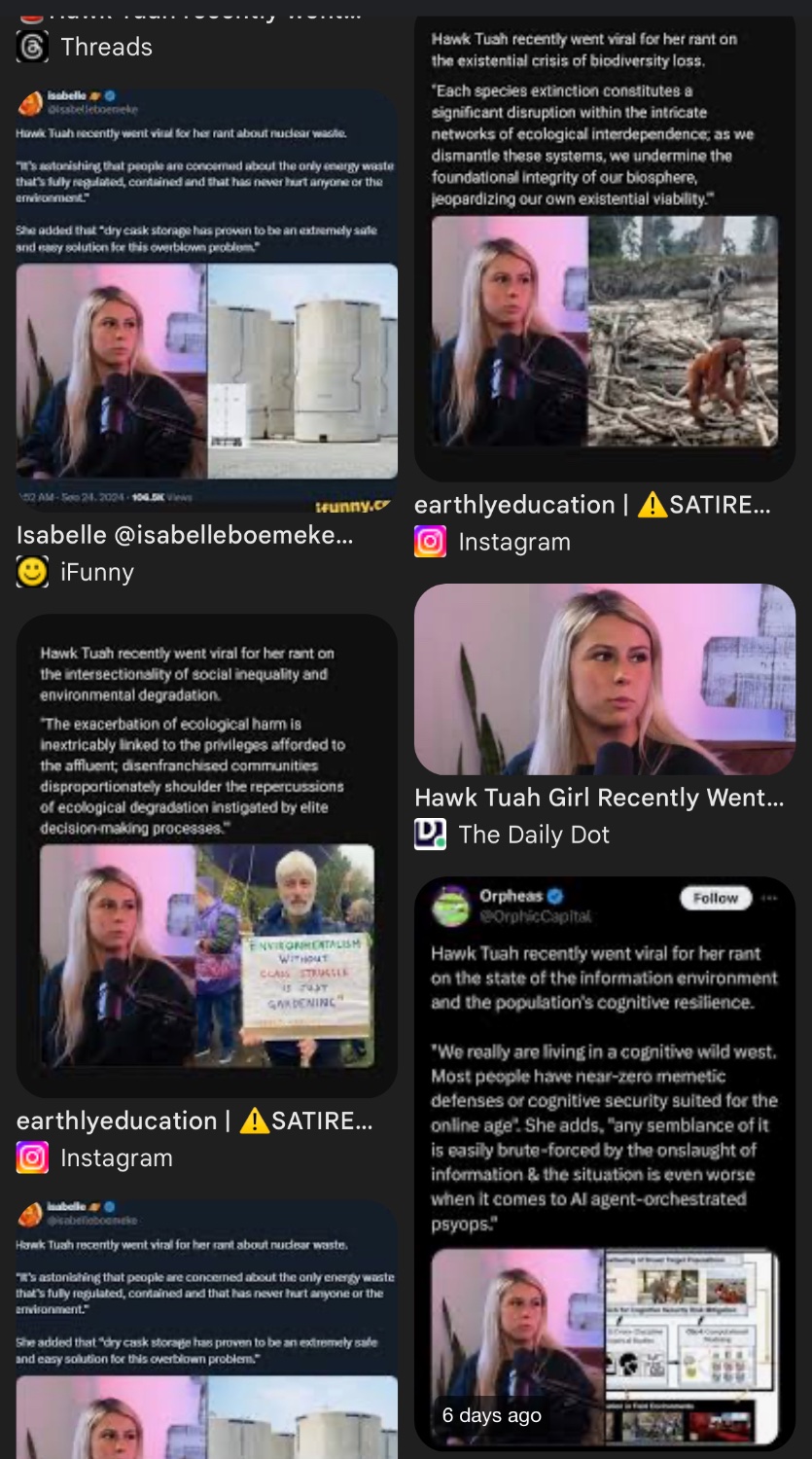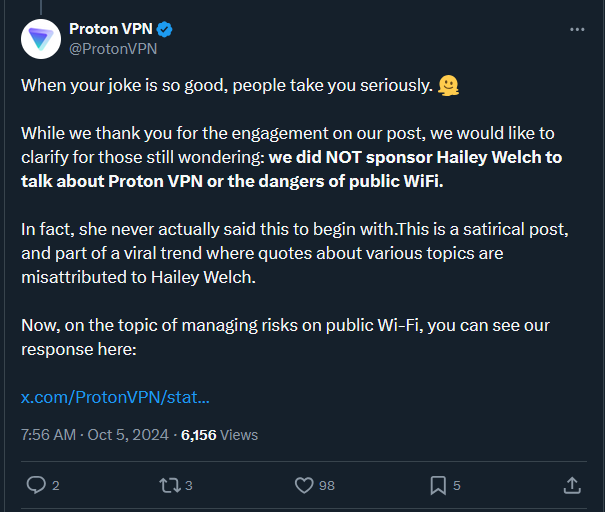Also - using someone who got famous by describing sucking dick seems quite weird :) Who wants technical advice from her?
That’s the joke.
What does sucking dick have to do with technical competency?
So I’m confused networking stuff has never been my strong suit, is this saying you can still be fucked on public WiFi even if you connect through a VPN?
Yes, to a degree. A VPN protects you from an attacker on the same WiFi network as you and that’s about it.
Most assaults on your privacy don’t happen like that, and for the most part the attacks that do happen like that are stopped by the website using https and proper modern security.
The benefit of the VPN is that it puts some of that protection under your control, but only as far as your VPN provider.A VPN is about as much protection from most cyber attacks as a gun is.
They’re not a security tool, they’re a networking tool. They let you do some network stuff securely, and done correctly they can protect from some things, but the point of them is “this looks like a small, simple LAN, but it’s not”.
It’s much easier to package and sell network tools than security tools, and they’re much more accepted by users, since security tools have a tendency to say “no” a lot, particularly when you might be doing something dumb,and users hate being told no, particularly when they’re doing something dumb.
is this saying you can still be fucked on public WiFi even if you connect through a VPN?
The quick and dirty answer is no, unless an attacker can figure out a way to get your VPN to strip it’s encryption (doubt you’ll ever see this outside something like defcon but you never know lol).
The long answer is that not all VPNs are equal depending on what you are trying to accomplish.
A VPN will simply tunnel your internet traffic over an encrypted channel to a server anywhere in the world.
On a technical level, this means that it will guarantee your internet traffic is unreadable until it hits the destination, which does mean it can make it more secure to use a public wifi/hotspot.
Of course privacy is actually a massive security iceberg, so some caveats in no particular order are:
spoiler
-
Modern protocols like HTTPS are already encrypted, although someone can still mess with stripping and poisoning techniques, so having a VPN running would be peace of mind.
-
Your privacy from companies like Google, Facebook, etc won’t be enforced by a VPN if you don’t also use a new browser session (incognito) because they can easily track your identity via cookies and accounts.
-
Even if you use a fresh session and dedicated VPN accounts, aforementioned tech companies can still identify you via statistical modeling based on your activity. They don’t really care what your IP is unless they need to pay tax for a country or follow some random media block law.
-
Your privacy from the government is nonexistent because most VPN companies will share your info if the government requests it.
-
Lots of VPNs choose to block torrenting so they don’t have to deal with protecting their customers (although lots also don’t).
-
Even if you setup your own VPN via a VPS in anonymous way, the government can still watch your exit traffic and link the origin back to you by inspecting the VPN packets (which is why Tor exists, a much different solution to the privacy problem).
You should use a VPN if:
- You want to torrent copyrighted material (yar har piracy)
- You want to spoof your location to get access to geolocked content
- You want to negate an attackers ability to mess with your connections on public WiFi
- You want a secure channel between two of your own locations (make two separate networks accessible to eachother, or VPN to home/work to access resources on that network).
- ^ same thing but remote access etc.
You should not use a VPN if:
- You need to hide what you do on the internet from the government (See Tor, journalists stuck in shithole regimes).
- You want privacy from internet megacorps (you’d have to keep fresh sessions or use them sparingly which you can 90% do without a VPN anyway)
- You want to hide anything after it reaches the VPN server (public VPN services, doesn’t apply if you VPN to something you physically own and access only its local resources).
–
After all that, the use case basically becomes:
- VPN to within your own country to secure your connection on public WiFi
- VPN to home or work to access network
- VPN with a good public service to other countries to watch or torrent media
-
Networking stuff IS my strong suit, and I’m confused about what points most people here, including OP, are trying to make here. Maybe I’m just not awake enough yet.
Wtf proton what? What do people think Proton is saying and what’s the WTF part…?
I don’t think the confusion has anything to do with networking. I’ve been puzzling over this post for a few minutes now… To be honest, I think I’m just more confused.
Maybe this is some sort of AI battle of the wits or contagious stroke or something.
Look at the link in the description.
Basically, someone went on a rant saying using public wi-fi w/o a VPN is extremely risky, and Proton is basically boosting it, implying a relationship w/ the OP. Proton argues that this is satire and part of a viral trend of misattributing quotes and topics, and the poster here is calling Proton out on it, likening them to the scammy VPN companies that sponsor YouTube videos and other SM content that oversell their claims.
So basically Proton claims they’re being satirical, and the poster is saying they’re just as bad as other VPN companies.
no, you can’t have intercourse over the Internet.
There are some attacks you are vulnerable to on public WiFi that a VPN can help with.
More generally, whoever is transporting your data knows who you are talking to. If you don’t use a VPN, your ISP and whoever owns the router know what websites you are visiting (although they don’t know the specific content). If you use a VPN, your ISP and router know you are using that VPN, but not what websites you are visiting. Now your VPN knows what websites you are visiting, but they still don’t know what the content is.
I hope that helps.
What about DoH/DoT which comes enabled by default in some browsers I believe? This should “hide” your activity from isp/router as well, shouldn’t it?
The ISP will always know the IP you’re connecting to. Encrypted DNS might get you slightly more privacy for sites using shared IPs like with Cloudflare. But in a lot of cases, there’s only 1 website per IP, so the ISP still knows where you’re browsing. A VPN solves this by routing all traffic through the VPNs IP first. But you can still be tracked just the same by the VPN and to an extent, the VPNs ISP.
Yes and no.
Modern HTTPS connections send the URL you are connecting to in the initial hello, so the remote webserver knows what security certificate to use when you connect. A lot of web servers host multiple sites, especially for smaller webpages, and so it doesn’t assume that since you connected to that specific webserver, that you’re connecting to the site that the webserver is hosting, even if it’s only hosting a single site.
This can leak the data to anyone sniffing the traffic.
You can also determine some traffic by IP address, this is for larger web services like Facebook, youtube and other sites of similar size. They load balance groups of IPs for their traffic, all are serving the same data. So if you connect to an IP that’s owned by Facebook, for example, then your actions can be easily derived.
Since the connection is still secured by TLS, the content can’t be deciphered, but the location you are going to absolutely can.
It really depends on a lot of factors.
Ok, thank you and all the others for explanation.
DoH & DoT still leak the domain name (and of course IP address) you’re connecting to. The domain name leak can be solved by Encrypted Client Hello but that’s still a draft and not turned on for many servers.
What about using tor instead of a vpn?
You can substitute “Tor” for “VPN” in the above and be largely correct. Tor acts like a VPN, but every packet goes through multiple hops, so an attacker would need to do quite a bit of work (i.e. compromise multiple nodes) to link traffic to you.
So:
- TLS (https) - network owner can’t see specific content, but can determine what sites you visit
- VPN - network owner can’t tell what sites you visit, but can tell you’re on a VPN; VPN can tell what sites you visit, but not specific content
- Tor - network owner can’t tell what sites you visit, but can tell you’re using Tor; Tor exit node operators can see what sites people using it visit, but can’t attribute it to an individual user w/o a sophisticated attack
In most cases, TLS is perfectly fine, provided you make sure to not click through any TLS errors (i.e. certificate can’t be validate => probable middle-man attack), and using a VPN is probably overkill. A VPN protects you from that middle-man attack, but honestly, if you’re savvy enough to use a VPN, you’re probably savvy enough to not get compromised by a middle-man attack. Likewise if you use Tor, you’re probably savvy enough to not get compromised by a middle-man attack.
That said, I fully support using Tor and VPNs, I just won’t go so far as to say someone is dumb for not using them on public Wi-Fi. Make sure you’re connecting to a real Wi-Fi service and don’t disable TLS protections and you’re probably fine, from a security perspective. If you’re likely to be targeted by a government agency, Tor is the bare minimum of what you should use.
Yup. The way I’ve always described it is this:
Http means your employer knows you watched porn on the company WiFi, and they also know which specific videos and what your username for the site is. If site security is particularly lax, they may even know your password.
Https means your employer can see you watched porn on the company WiFi, but they don’t know which video(s) specifically, and they don’t know your login info.
VPN means your employer only knows you connected to a VPN. They may be able to take educated guesses at what type of content you were viewing (streaming video, for example, has a pretty easily identifiable pattern of data transfer,) but they don’t know what video you were watching, or what site it was coming from. The VPN service knows you watched porn, but the aforementioned rules about http and https still apply; If you’re using https, they don’t know specifics.
Tor means even the VPN doesn’t know which specific video(s) you’re watching, because they just see a connection to another Tor node, which sees another tor node, which sees another tor node… Etc. In order to know what you’re watching, they would need to own every node in the chain. If they own both the entry and exit node they may be able to match it to you with a timing attack, (they see packets going into the Tor network at the same time they see packets coming out towards you). Again, they can make educated guesses based on pattern recognition, but they won’t have a clear picture without owning both your entry and exit nodes and performing a timing attack.
Now you can substitute “your employer” for anyone who is trying to get your info. Public WiFi spoofer, your ISP, etc…
Probably worth noting that, if you are using an employer owned system to watch said porn, they likely have software on the endpoint which will let them see what porn you are watching, regardless of HTTPS/VPN/Tor. Depending on how much your employer cares about such things, that may or may not come back to bite you. I’ve worked at places where we regularly reported on users watching porn on work computers, and I’ve worked at places where we only reported on users getting malware while browsing porn at work. But, never assume your activity isn’t being monitored on employer owned systems.
No, the context is that for many years, shady commercial VPNs would sponsor YouTubers and the scripts they were given were full of lies and half truths about the dangers of public WiFi, with the implication being that if you purchase their VPN service they will “protect you”. But the problems these VPN companies were claiming to solve have already been solved by HTTPS and it’s perfectly fine to use public WiFi without a VPN. They are using scare tactics to sell you a product.
What this poster is saying is that they’re disappointed to see this same fear mongering misinformation from Proton, who have an otherwise good reputation for being consumer friendly.
Exactly. Using a VPN can improve your anonymity, provided you trust your VPN operator more than the infrastructure you’re using. But many VPN vendors claim a VPN is essential to provide security, which isn’t true in the slightest, and Proton shouldn’t be stooping to that level. There are plenty of good reasons to use a VPN that don’t involve illegal activities, but it’s hardly essential for the average person.
Yes. X.509 means https is worthless protection from APTs
This was poorly executed. The National Park Service twitter account does jokes well.
I have a vpn for… reasons… 🏴☠️⚓️🏴☠️
I have VPN so I can look at porn.
Dude!
I just wanna look at me Japanese cartoons
why?
or Utah
Texas ig
Wow, I left the US ten years ago, I had no idea it had got this bad. You need a VPN to browse porn? :(
It depends on your state. There’s a handful that passed laws requiring porn sites to verify age via ID. Several sites have just outright banned them based on IP as they don’t want to deal with the privacy nightmare.
Then sometimes you’re like me, living in AZ, not even on a VPN, being told “You Texans should be asking for ID” and just wondering how the fuck that’s happening
What’s AZ? Azerbaijan?
Land of the free
Yup, browsing on lemmynsfw is interesting, because redgifs automatically blocks Texas IPs. So it’s a nice handy reminder to enable my VPN, because gifs refuse to load.
The only real use case for VPNs is to bypass geo blocking on streaming sites, and the VPN providers know this. They also know that if they lean too hard into that, eventually someone will sue them and their business model will evaporate - so they add the “iT MaKEs yOu mORe SeCurE” nonsense as a fig leaf so they can say with a straight face that they operate a product with legitimate uses
That is definitely what 90% of people use them for.
I think Tom Scott is the only person who’s ever done an honest VPN sponsor read.
I can’t say VPNs are great for bypassing geo restrictions in 2024, unless you’re talking about tunneling through your home network.
you gotta love the “lol joke” fall back. the same strategy used by generation of trolls
Thank goodness someone explained that to me. I was startong to wonder if she was some sort of technology expert, or something.
Who is she?
the girl from the memes a few weeks ago https://knowyourmeme.com/memes/hawk-tuah-girl
Taking cybersecurity advice from someone called Hawk Tuah is modern day version of clicking banner that says find 40+ single women in your zip code
Hot MILFs wanna talk to YOU!
I’m not online enough to understand this.
Hailey “Hawk Tuah” Welch is an influencer that gained a lot of popularity from her nickname (the sound of spitting, with HEAVY implications of performing fellacio). She used her platform to voice a very reasonable and intelligent opinion, which surprised a lot of people because her nickname is essentially blowjob queen.
One of her opinions is that it’s important to spread cyber security and used her fame to try to educate the public (potentially a fake story from the image? Idk this drama). And some xit-head claiming to be a cyber security expert ate the onion and offered some shitty advice. Proton fact checked them, because there are a ton of fake news stories about her right now.
Hailey “Hawk Tuah” Welch is an influencer
Ah, OK, I’m out.
Thanks for clarifying. This thread has felt like the cyber security equivalent of the Flat Earth Theory.
Popular format


Sorry, not just implication; she was straight up talking about that.
I’m pretty sure that Proton quoting her in the first place is fake. I know she’s milking her 15 minutes of fame for all she can, but this seems outside her experience.
but this seems outside her experience.
When has that ever stopped people from saying shit.
how do I reboot my computer?
Throw a brick at it.
That’s just turning it off with Style✨
that’s gonna brick it. it’s right there in its name.
people on the internet and their advice sometimes, ffs.
Nah, you just gotta do it correctly, yeah you might brick a few computers, TVs, cars or a couple electrical mains boxes, but once you master the technique you’ll be able to restart anything.
We call that percussive maintenance… the brick is optional.
Mulvad.
Don’t hire that contractor lol
I’m sure as shit trusting proton over some random public network in a cafe setup by some random open reach engineer or something
They have 54% one star reviews on TrustPilot
But none that I saw were about security/privacy instead just comments about pricing.
I assumed it was a joke. My feed has been full of jokes about her talking about urban planning and transit oriented development.
"It’s a prank bro"😅 but seriously as an IT guy I’m tired of pushing VPNs down our (collective) throats, not saying the threat isn’t real but it’s really overblown by the ads
Just free, unregulated market shenanigans.
Better to have ads pushed down our collective throats than let collectivists have us by the throat. An ‘unregulated’ market lets us choose whether or not to use them, instead of justifying their necessity to avoid censorship.
This was nothing more than a poorly executed joke from Proton. Some people are massively overreacting.
How could one have known that this was meant as a joke?
I like Proton but to me it seems like the social media person from Proton did an oopsie and as a reaction they try to save it.




















